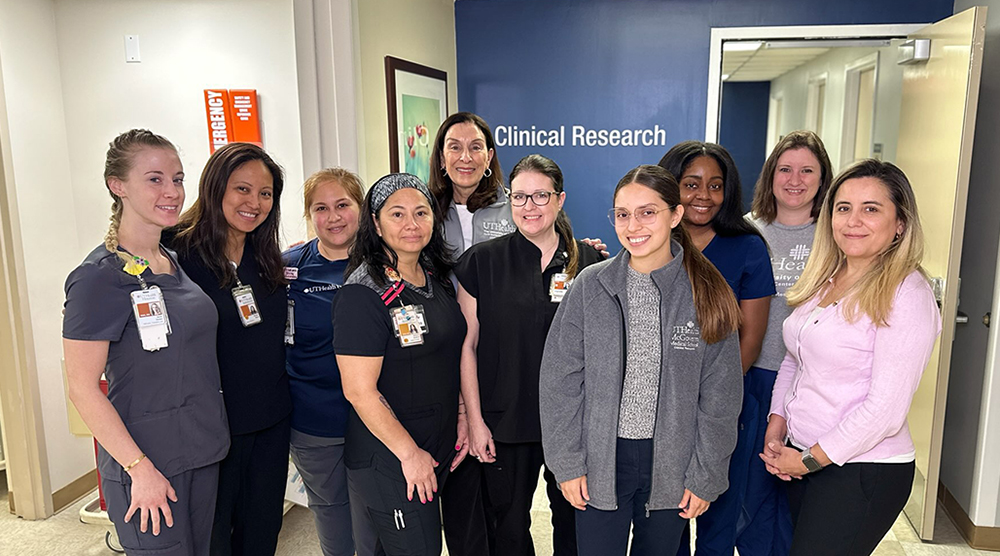Clinical Research Units
Dedicated Clinical Research Units (CRUs)
The CCTS CRUs help to facilitate clinical research by providing investigators with specialized facilities, personnel, and advice. Investigators from CCTS institutions may use any of the CCTS CRUs, depending on the location of their patients and the availability of services at the CRUs.
UTHealth CRU at Memorial Hermann—Texas Medical Center
Houston, Texas
Left to right: Sarah Darden, RN, Senior Research Nurse; Michelle Mayon, Regulatory Program Manager; Candace Hernandez, Lab Manager; Estela Acosta, RN, Assistant Nurse Manager; Theresa Dancsak, RN, Nurse Manager; Cynthia Sturm, RN, Senior Research Nurse; Layla Rivera, Administrative Assistant; Amanda Baptiste, RN, Senior Research Nurse; Ashley Persons, Research Associate; Cristina Dyke, Senior Manager Clinical Trial Program. Not pictured: Kalpana Ballal, RN; Kathy Franco, RN, Operations Director.
The UTHealth CRU at Memorial Hermann—Texas Medical Center began as the UTHealth General Clinical Research Center in 1986. The UTHealth CRU at Memorial Hermann—Texas Medical Center offers researchers an optimal on-campus resource and expanded capabilities for conducting clinical investigations and serves as an environment for training health professionals in clinical research. The CRU, located on the 3rd floor of the Robertson Pavilion in Memorial Hermann Hospital, is devoted entirely to the implementation and conduction of clinical research.
The UTHealth CRU team consists of 5 clinical research nurses with a variety of clinical backgrounds, 2 lab specialists, 1 regulatory specialist, 1 coordinator, and 3 administrative support staff. All staff members, most of whom are cross-trained with coordinating and lab experience, work closely together to offer expertise and deliver the best clinical research support to the CCTS research community.
The CRU provides access to specialty core services such as:
- 5 outpatient and 4 inpatient rooms
- Scheduling diagnostic tests and procedures
- A chart room and a physician charting area
- Consulting support in the early stages of protocol development
- In-patient and out-patient clinic space
- Nursing and coordinator services
- Regulatory monitoring
- Lab services, including cell reconstruction and nitrogen storage
- Research training
- CRU staff who can be sent to clinical areas in Memorial Hermann Hospital, such as the intensive care units, emergency room, operating rooms, clinical units, ambulatory clinics, and diagnostic facilities such as imaging suites
- Administrative services, including budget development, parking validation, meal tickets, and petty cash services. Fees vary based upon protocol needs.
To use the CRU, investigators must complete the UTHealth IRIS/CCTS and MHH applications.
To receive a budget from the CRU, please send your protocol to CRUscheduling@uth.tmc.edu.
Medical Director: Miguel Escobar, MD - Miguel.Escobar@uth.tmc.edu
Co-Medical Director: Elmer Bernstam, MD - Elmer.V.Bernstam@uth.tmc.edu
Operations Director: Kathy Franco, RN, BSN, CCRC - Kathy.D.Franco@uth.tmc.edu
Nurse Manager: Theresa Dancsak, RN, MSN - Theresa.Dancsak@uth.tmc.edu
Sr. Clinical Program Manager: Cristina Dyke, MCTM - Myriam.C.Dyke@uth.tmc.edu
Lab Management: Candace Hernandez, BS - Candace.Hernandez@uth.tmc.edu
CRU Office: 713-704-4137
UT M. D. Anderson Cancer Center CRU
Houston, Texas
Director: David S. Hong, MD
Contact: Yagut Retondo, MHA, Department Administrator - yeretondo@mdanderson.org; Brenda Brown, RN, MSN, OCN, Admin Director, Ambulatory Infusion - BBrown1@mdanderson.org
CRU Office: 713-792-2144 - ctrc@mdanderson.org
Created in 1990, The University of Texas M. D. Anderson Cancer Center Clinical and Translational Research Center (Anderson CRU) is the dedicated UT M. D. Anderson site for complex biologically based new drug development. With its 32-room nursing area and adjacent full-function laboratory, the 12,660 sq. ft. CRU is an ideal location for performing intensive clinical trials with a focus on first-in-human Phase I and Phase II studies with rigorous time points and pharmacologic testing. The Anderson CRU provides a unique resource for physician-scientists and clinical investigators to develop new agents for the treatment of cancer and related diseases by offering coordination of multidisciplinary research, regulatory compliance, budget development, intensive and time-sensitive monitoring of patients, phlebotomy, and prompt, accurate processing, storage, tracking and shipment of specimens. Please contact the CRU office to learn more about using the space for your research.
UTHealth School of Public Health Brownsville CRU
Brownsville, Texas
Directors: Joseph McCormick, MD; Susan Fisher-Hoch, MD
Nurse Practitioner: Lori Campos
Contact: Norma Perez-Olazaran - Norma.P.PerezOlazaran@uth.tmc.edu - 956-755-0695
Program Manager: Rocio Uribe
Since 2004, the Brownsville CRU has been an integral part of the UTHealth General Clinical Research Center, which is part of the CCTS. The Brownsville CCTS CRU is located about a mile from the U.S.-Mexico border. The CRU is adjacent to the central Valley Baptist Brownsville Medical Center, in a suite in the Professional Building donated by the hospital. The unit is affiliated with The University of Texas School of Public Health (SPH) Brownsville Regional Campus and its Hispanic Health Research Center, which focus on diseases that are common in Hispanic populations. Brownsville is part of the Texas Lower Rio Grande Valley, which is about 95% Mexican American and has a high incidence of chronic degenerative diseases including diabetes, hypertension, and heart disease. The area also has severe health disparities and a high proportion of uninsured and indigent inhabitants. Through their programs, the SPH Brownsville Regional Campus, the Hispanic Health Research Center, and the Brownsville CRU work to improve the health of the local community.
The Brownsville CRU uses a unique team approach tailored to the local community to conduct clinical research in the Lower Rio Grande Valley. Brownsville CRU investigators work with locally recruited research staff who are Spanish-speaking and bicultural and can more easily access the difficult-to-recruit local population. The research staff recruit subjects and are trained in human subject protection and the intricacies of the studies on which they are working, including sample collection and clinical examinations and a range of imaging modalities, including cardiovascular, hepatic, and ocular. They work within the community, including house to house recruiting, to identify potential subjects for clinical studies.
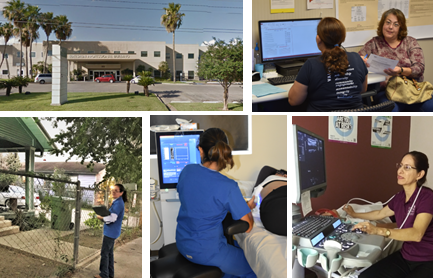
The Brownsville CRU is open Monday through Friday during business hours and some Saturdays. It is staffed by a Project Manager, a Project Coordinator, an ultrasonographer a part-time nurse practitioner, and 7 research assistants. The unit is about 4500 sq. ft., is dedicated to outpatient services, and includes a waiting room, 7 examination rooms, a laboratory for rapid sample processing and storage, an area for charting by staff and investigators, office space for patient scheduling and follow-up, and an interview/conference room for long patient interviews, staff in-services, and investigator meetings. Data are collected directly onto dedicated laptops and entered into main databases daily. Equipment includes several ultrasound and FibroScan machines, PAD equipment, and a DEXA scan machine, and there is a dedicated echo examination room. The CRU is supported by a research and CLIA-approved diagnostic laboratory of about 6000 square feet, managed by a laboratory director supported by technicians and graduate students. The laboratory has a large specimen archive. The CRU is also supported by a data management team, which assists with data entry screens (REDCap and custom) and cleans and distributes databases on a regular basis. All data are behind the University firewall.
The Brownsville CRU encourages inquiries from investigators who wish to conduct studies with the Lower Rio Grande Valley Hispanic community or to participate in ongoing studies in the CRU. The following ongoing studies in the CRU are open to other investigators.
Cameron County Hispanic Cohort (CCHC)
This is a cohort of 5000 randomly selected individuals in the community. Participants are followed up with regularly at 5-month intervals, some having been seen over 15 years. Consent includes permission to be enrolled in additional studies and genetic studies. Extensive socioeconomic, family history, and routine clinical data (including mental health data); hematological, metabolic and lipid profiles; and a range of imaging data are collected at each visit. Biological specimens are archived for metabolic, genetic, molecular, and immunological assessment. This cohort is available for studies ranging from epidemiological studies of prevalence, clinical aspects, and basic mechanisms of disease in Mexican-American populations to evaluation of intervention strategies (including vaccines) to behavior modification with opportunities for clinical studies in and extensively documented Mexican American population,
Diabetes risk nested cohort
This is a cohort of more than 300 CCHC participants who has been diagnosed with type 2 diabetes. These participates were seen between 2008 and 2013 at 3-4 month intervals for data and specimen archiving. Most remain in the cohort for regular follow-up visits.
Cardiovascular studies
Several studies have been conducted or are underway using cardiovascular imaging at regular intervals (EKG, carotid intimal thickness, flow mediated dilatation, echocardiograms, and ankle-brachial indices to assess peripheral artery disease). These studies in this low-income Mexican-American population are in collaboration with the UTHealth McGovern Medical School in Houston and the San Antonio Health Science Center.
Studies of liver disease and liver cancer
Several funded studies of liver disease and liver cancer are in progress, primarily in collaboration with M. D. Anderson. We follow participants with serial FibroScans to assess liver fat and liver fibrosis to assess progression and associated risk factors. A study of hepatocellular carcinoma patients and their immediate family members is also underway.
Genomic and metabolic studies
Collaboration with Vanderbilt University and University of North Carolina and others has allowed genotyping on the MEGA chip of most of the CCHC participants. Other studies include RNASeq studies looking at the progression of diabetes in terms of changes in gene expression and epigenetics. Metabolic studies include lipid panels and a large lipidomic database.
COVID-19 studies
During most of 2020, cohort participants and some other outreach subjects were reached by phone on multiple occasions. Data on potential exposure to COVID-19, symptoms, and results of SARS-CoV-2 tests were documented. In September 2020, all participants were gradually brought into the CRU for full examination and follow up. This has created a large archive of participants with pre- and post-COVID specimens and data and changes in RNASeq expression are underway. As of September 2021, 300 CCHC participants have been fully studied, and the program is ongoing.
Cervical cancer studies
In the Lower Rio Grande Valley, the rates of cervical cancer are among the highest in the United States. Intervention studies in collaboration with M. D. Anderson are in progress to increase rates of screening and treatment in the underserved. The CRU is assisting with these studies, concentrating on uninsured women.
Tu Salud, Si Cuenta!
This community outreach program uses behavioral journalism to transmit messages to the community by TV, radio, and newspapers. It has been extensively evaluated and is supported by a network of promotoras (community health workers).
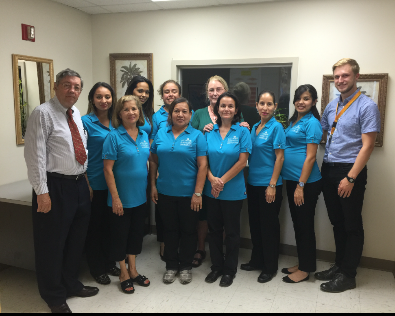
For more information on these studies, on conducting other studies in the Brownsville CRU, or on the Brownsville CRU in general, see http://www.hhrc.info/ or contact Christina Villarreal (Christina.Villarreal@uth.tmc.edu) 956-882-6677. To use this CRU, investigators must complete the UTHealth iRIS/CCTS application.
Center for Clinical Research at UTHSC-Tyler
Tyler, Texas
Director: Debbie Fielder - clin.res@uthct.edu - 903-877-7753
The University of Texas Health Science Center at Tyler’s CRU resides in the university’s Center for Clinical Research. As the premier academic research center in East Texas, the Center specializes in ground-breaking research that produces new treatments and therapies across a wide range of medicine. The Center is also unique in specializing in pulmonary research and conducts the most lung-related trials in the nation. The Center’s staff includes highly trained professionals that conduct research of the highest quality for the most comprehensive, cost-effective treatments possible.
The Center for Clinical Research supports all clinical trials by providing space and technology for conducting trials and through regulatory oversight of research studies. Services include:
- Submission, activation, and management of clinical trials
- Education of research staff on clinical research
- Auditing and monitoring of active clinical trials
- Assurance of regulatory compliance of new drug studies
- Financial management of protocols
- Data safety and monitoring
To use the Center’s services, contact Debbie Fielder or visit the center’s website at https://www.uthct.edu/center-for-clinical-research/.
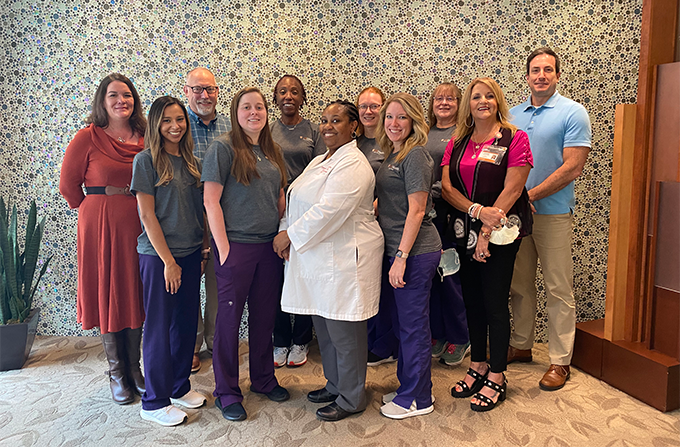
The staff of Tyler's CRU.
UTHealth CRU at Lyndon Baines Johnson (LBJ) Hospital
Houston, Texas
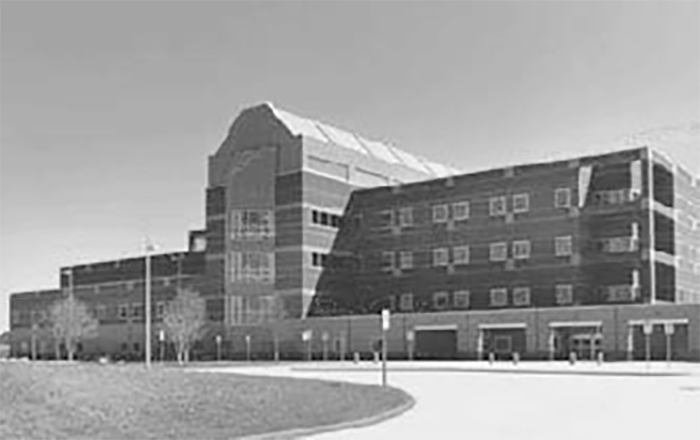
Director: Elmer V. Bernstam, MD - Elmer.V.Bernstam@uth.tmc.edu
Co-Director: Miguel Escobar, MD - Miguel.Escobar@uth.tmc.edu
Operations Director: Kathy Franco, RN, BSN, CCRC - Kathy.D.Franco@uth.tmc.edu
Nurse Manager: Theresa Dancsak, RN, MSN - Theresa.Dancsak@uth.tmc.edu
Sr. Administrative Manager: Cristina Dyke, BA - Myriam.C.Dyke@uth.tmc.edu
Sr. Research Nurse: Estela Acosta, BSN - Estela.A.Acosta@uth.tmc.edu
Lab Management: Candace Hernandez, BS - Candace.Hernandez@uth.tmc.edu
CRU Office: 713-566-4662, 713-566-4258 or UTHealth CRU Office 713-704-4137
The UT Health CRU at Lyndon Baines Johnson (LBJ) Hospital began in 2013 as a service to help LBJ investigators design and implement protocols and a liaison for working with the community to understand its research needs. Today, the UT LBJ CRU offers researchers resources for conducting clinical investigations and training for health professionals in clinical research. The purposes of the LBJ CRU are to facilitate collaborative research among UTHealth and M. D. Anderson investigators with LBJ clinicians and investigators, to increase research capacity and productivity among LBJ clinicians, and to increase access to cutting-edge research for a patient population that is historically underrepresented in clinical trials. The partner institutions, Harris Health System, UTHealth, and M. D. Anderson work together to identify and lower barriers to research in this indigent health care environment.
The CRU office is located in the LBJ UT Annex room 116 and is devoted entirely to the implementation and conduct of clinical research throughout LBJ clinics, hospital, and community outreach clinics.
The CRU team consists of 1 clinical research nurse with a broad clinical background and 1 experienced study coordinator. The UTHealth CRU backs up the UT LBJ unit with nurses, coordinators, lab specialists, and administrators. All staff members, most of whom are cross-trained with coordinating and lab experience, work closely together to offer expertise and deliver the best clinical research support to the UTHealth and LBJ research community.
The CRU provides access to specialty core services such as:
- Consulting support in the early stages of protocol development
- Nursing and coordinator services
- Regulatory monitoring
- Vital sign machines and ECG testing
- Lab services including cell reconstruction and nitrogen storage (at UTHealth)
- Research training for physician and staff
- CRU staff who can be sent to clinical areas in the hospital, such as the intensive care units, emergency rooms, operating rooms, clinical units, and ambulatory clinics, and diagnostic facilities such as imaging suites
- Administrative services, including budget development, and petty cash services
Fees vary based on protocol needs.
To use this CRU, investigators must complete the UTHealth iRIS/CCTS application. Please contact Kathy.D.Franco@uth.tmc.edu or Estela.A.Acosta@uth.tmc.edu for a budget and to discuss study needs.
The University of Texas Rio Grande Valley CRU
Edinburg, Texas
Director: Timothy Heath, MD - timothy.heath@utrgv.edu - 956-362-3575
Contact person: Erik Hinojosa - erik.hinojosa@utrgv.edu
The University of Texas Rio Grande Valley School of Medicine Department of Internal Medicine has been active in the UTHealth Houston CCTS program since the creation of the School of Medicine. Efforts have been underway to identify physical premises for a CRU at The University of Texas Rio Grande Valley. Most recently, UTHealth RGV has inaugurated an ambulatory care outpatient clinic site on the campus of Knapp Medical Center (KMC), Weslaco, Texas, where four CCTS sub-award SARS-COV-2 /COVID treatment clinical trials have been occurring since 2020. With easy first-floor entry and sufficient clinical square footage and number of exam rooms and administrative office/team space, this clinical setting is supported by the KMC leadership for the shared vision of The University of Texas Rio Grande Valley and UTHealth of a University of Texas Rio Grande Valley CRU.
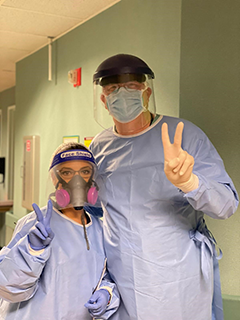
Ms. Brenda Lee Castañeda, Research Coordinator (L), and Dr. Timothy Heath (R).
